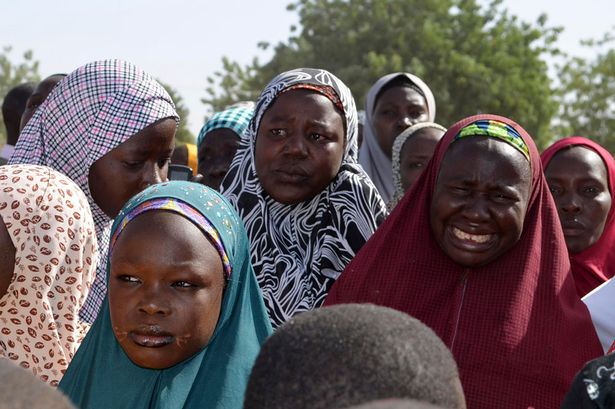Suspected Boko Haram gunmen kidnapped at least 20 young mothers near a town in northeast of Nigeria where more than 200 schoolgirls were abducted nearly two months ago.
News of the abduction came after gunmen from the militant group slaughtered hundreds of villagers in the north-east of the country.
There were conflicting reports of how many women were abducted from the nomadic settlement near Chibok in Borno state, with one local leader putting the number as high as 40, according to AFP.
The latest kidnappings, which happened on Saturday in and around the village of Garkin Fulani, five miles from Chibok, were the latest in a spate in the area.
‘Available information revealed that the gunmen came around noon and abducted 20 women and three young men left to keep watch on the village,’ said Alhaji Tar, of a local vigilante group.
‘All the males in the settlement were away in the bush with their herd (of cattle) for grazing when the abductors came to the village.’
There was no immediate indication of where the women were taken and there had been no contact from the kidnappers.
A local official of the Miyetti Allah Cattle Breeders Association of Nigeria (MACBAN) said 40 young mothers were singled out and put into vehicles before being driven to an unknown location.
MACBAN is the umbrella organisation of the nomadic Fulani cattle herders in Nigeria.
Similar kidnappings for ransom have been going on in the area for some time but locals were too afraid to speak out in fear of reprisals from the Islamist militants, the official said.
‘This is not the first time women are being kidnapped in this area and only released when we pay cattle ransom to the kidnappers. It has happened several times,’ said the official.
‘They come and go door-to-door bringing women outside and select young women and take them away in their vehicles and demand between 30 and 40 cows for their release’, he explained.
Locals always paid the ransom but do not inform the authorities, he said.
A Borno state government official, speaking on condition of anonymity, said the authorities were aware of the kidnapping of women from the village but denied knowledge of previous abductions.
‘This is the first time we are hearing abduction of Fulani women and we are working to establish the circumstances surrounding the kidnap and necessary action to take,’ he added.
On Thursday Boko Haram gunmen slaughtered hundreds of villagers in the far northeast corner of Nigeria, after arriving disguised as soldiers and promising to protect them.
Altogether, Boko Haram militants slaughtered hundreds of people in three villages.
A community leader who witnessed the killings on Monday said residents had pleaded for the military to send soldiers to protect the area after they heard that militants were about to attack.
The militants arrived in Toyota HiLux pickup trucks – commonly used by the military – and told the civilians they were soldiers and that they had come ‘to protect you all’, the same tactic used by the group when they kidnapped the Chibok schoolgirls.
‘We all thought they were the soldiers whom we earlier reported to that the insurgents might attack us,’ said the community leader, who spoke on condition of anonymity because he feared for his life.
After the militants forced everyone into the village centers, ‘they began to shout “Allahu akbar, Allahu akbar,” then they started to fire at the people continuously for a very long time until all who had gathered were dead,’ he said. Allahu akbar means God is great.
The killings took place in the villages of Danjara, Agapalwa, and Antagara, part of Gwoza district in Borno state. The community leader said he fled to Maiduguri, the Borno state capital, adding that some who escaped the massacre crossed into the neighboring country of Cameroon while others remain trapped in the mountainous region.
‘They still see the gunmen going about attacking villages and hamlets by setting them on fire,’ he said.
He said managed to survive because ‘I was going around to inform people that the soldiers had come and they wanted to address us.’ As people were fleeing, other gunmen lurked outside the villages on motorcycles and mowed them down.
The slaughter was confirmed by Mohammed Ali Ndume, a senator representing Borno whose hometown is Gwoza, and by a top security official in Maiduguri who insisted on anonymity because he isn’t allowed to speak to the media.







